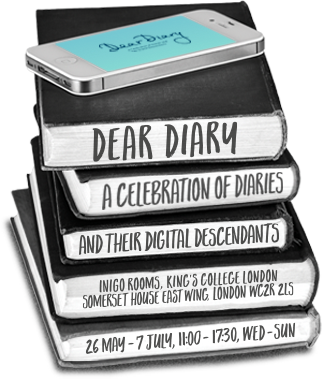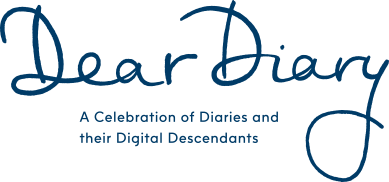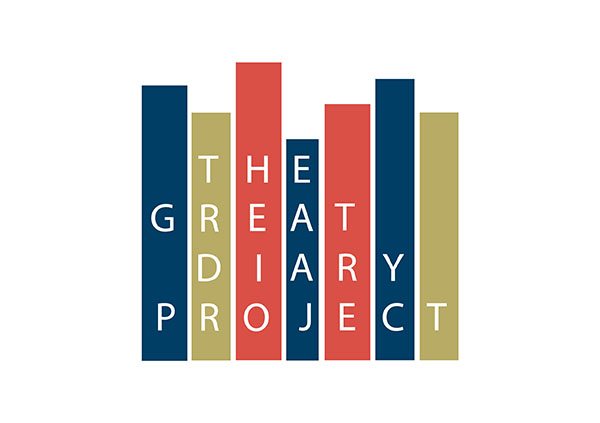Articles from Diary Devotees and Dear Diary Partners
Articles from Timothy Ashplant, Bernard Capp, EgoMedia (Polly to upload when provided)
Special Article from Joe Moran
The Mute Appeal of Diaries
By Joe Moran, May 2017
‘We were kept awake last night by New Year Bells,’ wrote Virginia Woolf in her diary for 1 January 1915, with the First World War five months old. ‘At first I thought they were ringing for a victory.’ There is something oddly touching about old diary entries for the first day of January. They are so full of hope for a year that has long since vanished into the past, and they often begin the diary-keeping habit itself—for this was Woolf’s first entry in a diary she kept for the next 26 years. In our own age, when blog posts and social networks host perpetual updates on the mundane details of people’s lives, in ways that would have seemed inconceivable even a generation ago, the long-term, unbending commitment to private diary writing feels like a heroic act.
In recent years, the diary of the private citizen has emerged as a particularly fertile source for historians. Diaries bring together a range of current interests in cultural and social history: the emergence of modern ideas of selfhood, the recovery of overlooked or marginalised lives (particularly those of women, who have often been diligent diarists), and the history of everyday, domestic and private life.
As historical sources, though, diaries are unusual. To write a diary for any extended period is an exceptional and eccentric act. If historians wanted to relate a truly representative history through diaries, they would have to include the vast, forgotten majority that did not see January out. In this alternative history it would be an eternal winter, populated by a tribe of initially loquacious people who suddenly become monosyllabic and then lapse forever into silence. The more dedicated diarists—the ones who carry on writing at least until spring—are always a self-selecting and skewed sample.
What fascinates me about diaries is their strangeness, the way they go off at weird, unexpected tangents that pull you up short. For historians diaries can serve as a useful corrective, in that they reveal the confusing randomness and singularity of everyday experience as it is lived. They help us to see the past as an era of still-to-be-decided tensions and contingent moments, instead of a story to which we already know the ending.
Diaries show us that daily lives are experienced corporeally, as a series of sensual pleasures or discomforts. On 1 January 1939, an obscure civil servant called Walter Musto began keeping a diary by recording that he had slipped off his nightshirt and stood naked in his Surrey back garden, ‘rubbing my body and limbs until I am aglow in the cold, sweet air’. In the diary he wrote for the next 6 years, Hitler gets barely a mention. Diaries are ruled by fleeting frustrations and passing piques. ‘The only papers were evening ones!’ complained Kenneth Williams on 1 January 1974. ‘It is little short of scandalous.’ The diarist’s default mode is bathos. ‘As I reluctantly swung out of bed I noticed my feet,’ wrote Alec Guinness on the first day of 1995, ‘never something on which I like to dwell.’
Reading other people’s diaries, you are constantly reminded that they are marks on a page made by a person. You can see a pencil getting gradually blunter until it is sharpened, or ink getting fainter until the cartridge is refilled, or furious crossings-out and underlinings that reflect the mood of a moment. Read en masse, as Irving Finkel puts it, diaries add up to a sort of ‘mute appeal’, a sense of the weight of anonymous lives lived mundanely but meaningfully. Private diaries tell us that history is made up of billions of separate consciousnesses, all swayed by their moods, caprices and animal instincts from one day to the next, and ultimately impenetrable to other human beings. It can be very moving to witness the determination of diarists to record the trivial details of their lives, if only to themselves.
Special Article from Dr Polly North
Dear Diary, Diary
by Dr Polly North, exhibition co-curator and director of the Great Diary Project.
On the 26th of February 2014, around about 6pm on a more or less temperate day, I meet Professor Clare Brant at a Centre For Life-Writing Research seminar, at King’s College, London. The seminar subject was (no surprises) diaries and the Great Diary Project.
I take the bull by the horns and write to Clare, on Tuesday 14th October 2014 at 13:56 with the idea of putting on an exhibition about…(no surprises) diaries.
This email and idea is what is now Dear Diary: A celebration of diaries and their digital descendants.
I’d already floated the idea of a diary-devoted exhibition past a couple of people, but no-one had been as positive as Clare. She responded almost immediately.
We had the first of many exhibition meetings on Monday 17th November 2014 at Clare’s Kingsway, London office.
Clare secured the first funding allocation for the exhibition on the 11th of December 2014, corporate funding had proved a no-no. It was Clare’s efforts over the next few months that secured (via 4 different funding streams) enough money to start exhibition planning. We thank from the bottom of all our diaries: the King’s College London English Department, Ego-Media research group and the European Research Council.
The initial funding (or seed fund from the Department of English, King’s) was designated to working with the artist Derek Eland, who later contributed a film called the Diaries of Others to the exhibition.
Early on Cultural Programming at King’s expressed an interest in hosting the exhibition at the Cultural Institute (to be precise, these happy tidings were heard by Clare in a corridor on the 4th of November 2014).
December 16th 2015 Clare has the idea of speaking with Dr Meg Jenson, Director, Centre for Life Narratives, Kingston University and Professor Brian Brivati, Director, The Stabilisation and Recovery Network about an installation presenting refugee diaries. This idea becomes A Day in their Shoes, an exhibit in Dear Diary.
Between November 2014 and December 2016 there were countless meetings in which we discussed what should go in and, more often than not, what would have to be left out due to space restrictions. Members of the Ego-Media group, including Dr Rob Gallagher and Dr Rebecca Roach, contributed to some of these meetings, bringing fresh insights and new ideas.
On the 10th October 2016 (almost two years after I had first proposed the exhibition) Gresty, the exhibition designer, came on board and we had the first (of many) meetings (again) in Clare’s Kingsway office, London.
On the 16th December 2016 I sent Clare the first draft of the timeline (what you see in the exhibition is the 17th version).
The final version of the timeline is confirmed on the 3rd of May 2017.
In his North London studio, on the 25th January 2017, Yeshen takes the photos that finally become the exhibition poster…
I send Clare the first draft of the Interpretation Panels for the exhibition, on the 13th March 2017.
Clare sends me the draft exhibition Guide on the 14th March 2017.
The final versions have passed through the hands of at least 7 people, including Kaye Mahoney of Cultural Programming and my dad Richard D. North. The final versions for print and installation are sent to the printers on the 5th May 2017.
Install begins in earnest on the 15th May 2017. Gresty arrives at the Inigio rooms at 9am to work with the rub-down installers, followed by me and the diaries, which I have picked up –fresh – from Bishopsgate Institute.
It takes five days to complete the installation to a standard that can be called anything close to an exhibition – and another four days to polish – I get around five hours from these nine days to lay out the diaries and their labels in the glass cases. The pattern for the display of diaries that you see in the exhibition begun life on paper in May 2015…..
Anna Arthur PR are brought in during March 2017, Clare’s newspaper article comes out in the Times on Sunday, on the 13th May 2017, and is the first of many successful media outings/ outpourings for Clare.
The exhibition opens with a preview on the 25th May 2017.
Visitor figures for the first weekend (the May bank holiday) exceed all expectations and we are all grateful to the visitors and diarists who have made the exhibition what it is today!
Special Article from Professor Bernard Capp
Almanacs and Diaries
By Bernard Capp, May 2017
John Gadbury, one of the leading astrologers of the later seventeenth century, subtitled his annual almanacs ‘A Diary of the Celestial Motions’ . Almanacs and diaries overlap in many ways. Almanacs record events certain or predicted to occur, while diaries record the actions, experiences and sometimes feelings of the owner. Moreover, many almanacs contained blank pages for owners to jot down personal notes and other memoranda. Many used them as pocket diaries, while the law-student Simonds D’Ewes, who kept a detailed diary elsewhere, filled the space with sharp comments (in Latin for safety) on public events, such as the bloodthirsty persecution of the Huguenots in France, and on Prince Charles’s maverick jaunt to Spain in 1622 to woo the Infanta. Almanacs were one of the most popular forms of cheap print from the Elizabethan period, and a significant presence in the cultural world of early modern England. Almanacs remain an under-used source, but scholars have long recognised the value of diaries. The diary of Samuel Pepys, probably the richest of all, throws unparalleled light on his entire world as well as his life. The more prosaic diary of Ralph Josselin, an Essex clergyman, allows us to trace shifting currents over forty years, shifts of which Josselin himself may have been barely aware. The diary of the spinster Gertrude Savile, a genteel eighteenth-century lady, provides fascinating glimpses of her fraught relationship with the servants ‘downstairs’. And the plebeian diary of the Manchester wig-make Edmund Harrold lays bare the contradictions in human character that no other source-type would reveal. Diligent and deeply pious, Harrold also emerges as a compulsive binge-drinker and quarrelsome drunkard. His diary stands as a warning against any easy generalisations about people in the past.
Diary Entry from Christopher Hammond and images from his father’s diary, June 2017
A note from Mr Hammond
In 2014 I decided to write a diary, starting on 6th June, the 70th anniversary of D-Day, addressed to my dad, who was involved in the Normandy landings. Dad kept notes on his WWII experiences, which he typed up in the 1950s in diary form. His notes, with neat little pen and ink sketches of the places where his company stopped for one or more nights in France, Belgium, the Netherlands and Germany, covered the period 6th June 1944 – 17th June 1945. Dad died in 1958, having typed up June 6th – Sept 28th 1944 in some detail. But time had run out. The diary, begun in Ampthill, Bedfordshire, ended on the Belgian/Dutch border, and although the notes and sketches of Dad’s months in Holland and Germany remain, much of the detail died in 1958 with Dad, who was 51 years old.
I was a 14 year old when he died, and my purpose in writing my 2014 diary to correspond, 70 years later, with the days of Dad’s progress through France and Belgium, was to tell Dad about my life and the life of the family he never knew and to bring him up-to-date with the world as it is in the 21st century. He didn’t know that my brother and I have children and grandchildren – his grandchildren and great-grandchildren; nor did he know that the Cold War ended in 1989, that men have walked on the moon and that we have jumbo jets, smartphones, organ transplants and the Internet. My diary is an attempt to fill in the gaps and to talk with the dad I last spoke to more than half a century ago. He, of course, is still 51 while I, his younger son, am 70. It’s an odd feeling talking to a younger man who remains, after all, my senior.
6th June 2014.
Dear Dad,
It’s been a long time, hasn’t it! Last time I spoke to you I was just a kid. Fourteen I was, and all I said was your name. I just said ‘Dad’, two or three times. And I touched your wrist or your bare arm, I can’t remember exactly, and when you didn’t answer I knew you were dead. I went downstairs and I told Mum and Auntie Connie, who was staying with us to help out with things because you were so ill. I didn’t actually say you were dead. I said I’d just been into your bedroom and you didn’t answer me. I remember feeling a kind of shame and guilt as the messenger. They rushed upstairs and I stayed downstairs with Ian, but we didn’t say anything to each other. And we heard Mum crying, a terrible sort of wailing, and that was it. You were dead and you were fifty one, and Ian was eighteen, and I was fourteen, and Mum was a widow.
It’s coming up to eight o’clock in the evening and it’s the sixth of June, so exactly seventy years ago, on D-Day, as you’ll recall, you were stationed at Ampthill in Bedfordshire and, as you say in your diary, which I’ve got on the chair next to me, at 8pm you and your Section were warned to stand by, ready to move off from Ampthill. Three hours later, at eleven, you were away in your trucks, driving through the night, destination Southampton.
Doesn’t it seem strange. Here I am talking to you, my dad, and you’re still fifty one, and I’m seventy, ‘cos I was just five months old when you went off to fight, and Ian was aged four. Can you believe it, I’m your younger son and I’m seventy years and five months old! As a baby I couldn’t know it was D-Day, I couldn’t know I’d been conceived in wartime and born while my country was still at war, and I’d never have known anything about what happened to you in France and Belgium and Holland and Germany if you hadn’t written your diary, ‘cos you never talked about any of it as far as I can remember. Occasionally, you mentioned some of your Army buddies to Mum, but you never told us what you did and what you saw. And we never asked. Now, of course, I’ve got a thousand questions I’d like to ask you, not just about the war and your part in it, but about all the things in your life that interest me because you’re my father. There are so many things that I’d never have given a thought to when I was a thirteen year old, which was my age when you started to become seriously ill, and I’ve never had the chance to catch up on all the conversations and discussions we could have had, if only you’d lived long enough for me to mature and know you properly, son to father, father to son, man to man.
Anyway, since today is the seventieth anniversary of D-Day the television is full of stories about the Normandy landings, and there have been services of commemoration in Bayeux cathedral and at the nearby war cemeteries. Some of the veterans, mostly in their nineties, (you’d have been a hundred and seven), travelled over to be there, as well as the Queen and Prince Philip and other members of the Royal family, and the heads of State of the other countries involved, plus the Chancellor of Germany. President Obama is there. He’s the President of the United States, and I imagine you’ll be pretty surprised when I tell you that he’s black – the first black president of the USA. And of course you won’t know that here in Britain we had a woman Prime Minister – from 1979 until 1990. And the Chancellor of Germany is a woman, too. Times have certainly changed since you were here, I can tell you!
I sent emails to my three children this afternoon reminding them that it was exactly seventy years since their grandad (that’s you, by the way) went off to war. You’ll be wondering what an email is and you’ll no doubt be taken aback to know that you have grandchildren. Well, let me start with the email. I think you’ll have an idea what a computer is, because there were a few around when you were here, but those computers were massive machines, whereas now they’re small, the size of a slim briefcase or even smaller, and almost everyone has one at home, in this country and in the developed world at least. There’s something called the World Wide Web, which means that all the computers in the world can connect with each other electronically, so people can send messages to one other, wherever they live, and it’s instantaneous, so I can send a message (an email) to Simon, my eldest, who lives in Norway and he can send me a message back in the few seconds it takes to type a reply. So I sent an email to Simon and the same one to Mariel, your granddaughter, who lives in London and to Alex, who also lives in London, a few miles from his sister. I’ll tell you more about them another day, but while you’re getting over the shock of learning that I have three grown-up children, I can tell you that Mariel has her own little brood of three, so you’re a great-grandfather as well as a grandfather. And, by the way, Ian has two grown-up children, Steven and Davina, and Davina also has two young lads. All of which makes you a grandfather to five and a great-grandfather to another five.
Alex, my youngest, sent me an email to say that he’s spent his day at work poring over old maps of Eastleigh which, as you’ll recall, is the very part of Southampton where you waited for the order to embark for France. And Alex sent his message before he got my email about you having that exact destination. Isn’t that an incredible coincidence! He works as an environmental consultant, so there must be some project he’s involved in regarding Eastleigh. In his second email he says he’s wondering what you must have been thinking as you drove with your fellow soldiers through the night on your way to war. You don’t say in your diary, so we can only guess that you probably had a whole load of things going on in your head. You must have felt some relief and perhaps excitement that you were finally going to do your bit to put an end to Hitler’s tyranny. After all, you’d been training and waiting for a very long time. But you must also have been worried or scared, not knowing what to expect, and being very much aware that you were leaving your little family, and not having any idea when, or even if, you would see us all again.
You don’t say anything about what you did before 8pm on D-Day, but just for the record I’m going to tell you what I did today. It’s going to sound trivial, I know, but I plan to tell you a little about my life each day that I’m following your journey so that you get to know me a little, now that I’m an adult.
Well, this morning I did a bit of reading. It’s a book called “Alone in Berlin” by a German author, who uses the pen-name Hans Fallada and it’s about a Berliner who spent the war years putting anti-Nazi postcards in various places all over Berlin as his way of resisting the Hitler regime. It’s based on a true story and it’s a fascinating tale. Stories and films about the Second World War are still very much in evidence in Britain and, perhaps because I was born during the War, and perhaps because of you and your experiences, I quite often read books about the period and watch some of the excellent documentaries that deal with the same issues.
After reading for a while I went out cycling. I go three or four times a week on a circular route of about fifteen miles along country roads. I love it. And yes, I believe I know what you’re thinking.
Don’t I have a job to do? Well no, I don’t. As I said before, I’m seventy years old, so I’m retired. I retired five years ago. I realise all this must seem very strange to you. After all, when you last saw me I was still at school, and I hadn’t even taken my ‘O’ Levels, and now here I am, a pensioner. And what did I do to earn a living? I’ll tell you that another time. Just let me tell you a bit more about my day today. When I got back from my ride I had a shower and some lunch and then I watched the tennis from Paris on television – The French Open. We’ve got a pretty good player these days – a Scot called Andy Murray. He won Wimbledon last year – the first Brit to win the title since Fred Perry in the 1930s. You’ll remember him, I know. Brit? Oh yes, we use the word Brit instead of Briton these days, but here’s something to give you a real surprise. In September this year there’s going to be a referendum for all residents north of the border to decide whether they want Scotland to be an independent country – after three hundred years of the Union. I’m sure that’s something you’d never have imagined. At the moment a majority of Scots seem to be in favour of remaining within the UK, but lots are still undecided, apparently. So you never know. And if they do decide to leave, we lose our best British tennis player, though having said that, he lost his semi-final match today in Paris, and he lost badly. Mind you, that was on clay, and they reckon he’s better on grass so, who knows, maybe he’ll win Wimbledon again in a few weeks’ time!
I was going to play badminton this evening, but I did something to my back when I was having my shower. I must have twisted or moved awkwardly and my back went. It’s a problem I’ve had on and off for years, so I know it’s nothing serious, but it’s a real nuisance and it’s quite painful. There, I told you my day would seem trivial, but that was it. Oh yes, and I’ve been writing this diary to you for part of this evening. And it’s now nearly midnight, so I’ll be off to my bed, but thinking of you as you rumbled along the roads of southern England during the night of June the sixth and into June the seventh, nineteen forty four.
7th June 2014
Dear Dad,
I wonder how you were feeling after your all-night drive in the army lorry. Your diary just says that you reached your Embarkation Camp at Eastleigh, Southampton at about 7am and hung about until 9 for a cup of tea. You must have been dog tired after eight hours of bumping around in a truck. The roads were not as good in the nineteen forties as they are now and I imagine army lorries were not exactly designed for comfort! I’m sure you can’t have got any proper sleep. After your cup of tea the call came for you all to proceed to the docks, which you reached at 10am. Your diary says you parked in side streets, where you stayed until ten at night. After that you embarked on a Liberty ship, and weighed anchor at eleven. That’s all you tell us about the actual day. I suppose you weren’t allowed to wander around the streets for those twelve hours in case the call came and you weren’t in place. Did you sit in your lorry playing cards all day or just chatting, or maybe talking nervously about what might be lying in store for you? Part of the day must have been spent eating, and perhaps you managed to get some sleep in the back of the lorry. I wonder how many of you there were competing for space in which to lie down and rest. And I wonder what sort of toilet and washing facilities were available for you. You see, neither Ian nor I ever did military service (conscription was abolished in 1960 – two years after you died) so we don’t know how these things were organised, especially when you were on the move.
It’s raining here today. Here, by the way, is a little village in the Vale of Aylesbury. I moved here in March this year and am still sorting things out so that I’ll be comfortable. It’s an old cottage – an almshouse in fact, one of a row of four, built in the 1760s, and it’s rather pretty. I think you’d like it. Mariel found it for me on the Internet and we came together in her car to look at it. We’d looked at eight or nine other properties in the Aylesbury area, but when we saw this little house we both immediately agreed that it was the one to go for. Selling my previous place and securing this one turned out to be a nightmare, but I won’t bore you with the details. Suffice to say that two so-called serious buyers of my property, (which was a modern, one- bedroom coach-house in Aylesbury), dropped out, each of them after many months, for different but equally weird reasons, leaving me desperate to find another buyer or risk losing this cottage. ‘The Internet?’ I hear you asking. Oh, Dad! You’d love it. You’d absolutely love it. I know you would. It’s a system of interconnected computer networks linking billions of devices around the world, so it’s possible, using your home computer, to access all kinds of information about almost anything, from a bus timetable in Peru to details and colour photos of houses on the market in Canada or Canterbury. It’s like the biggest encyclopaedia in the world, plus loads of other things. You can watch TV programmes weeks after they were shown live, you can exchange information with people all over the world, you can learn languages, play chess, listen to music, read electronic books, buy stuff, sell stuff, book theatre tickets or a holiday. You can do masses of things – things you or I haven’t even heard of! It’s phenomenal! Except that, like all human inventions, there are downsides as well as all the positives, but I won’t go down that road today. Some other time, maybe.
Tomorrow I was supposed to be playing tennis with a Japanese lady who occasionally goes to the badminton group on Friday evenings, but as I told you, I’ve hurt my back, so there’s no way I’ll be fit enough to run around a tennis court by tomorrow. I sent her an email to explain and apologize, and she replied, inviting me to go to her house today for a session of reflexology, which she says can help my back. Reflexology is a therapy which those who believe in it claim can be effective for a host of conditions, from infertility to arthritis, and of course back pain. I’m not a believer, but thought it would seem at worst boorish and at best ungracious to decline her offer, and you never know, it could turn out to be a pleasant experience. What the reflexologist does is massage and apply pressure to the feet, the theory being that reflex areas on the feet are linked to organs of the body ‘within the same zone’, whatever that means. I looked it up on the Internet and it says there is no scientific evidence that reflexology is effective, but anyway I went along this morning and was there for about three quarters of an hour. My back ache is still just as bad, but even adherents don’t claim that it’s an immediate cure, and I must admit I enjoyed having my feet (which I’d cleaned to perfection, in case you’re wondering) rubbed with various creams, and gently pressed and massaged. There was soothing oriental music playing in the background, and Hisako was good company and seemed to know what she was doing. It was all very relaxing, I have to say. I suppose you may be wondering why a Japanese lady lives in a tiny village in the Buckinghamshire countryside. Well, all I know is that she was married to an Englishman and has been here for more than twenty years. And no, I didn’t ask what her father or grandfather did during the war, in case you were going to ask me. Ha, ha! Only joking, Dad!
Like so many people nowadays she’s divorced. It’s not frowned upon or considered shameful, as it was when you were here. I’ve been divorced for ten years and Ian got divorced about twenty five years ago. It’s regrettable and sad that so many marriages end this way, but that’s just how it is. And another thing that might shock you is that most young couples these days live together without
getting married. Some tie the knot when they start a family, but a lot don’t, and again, there’s no shame or stigma to having children ‘out of wedlock’ as there used to be. Dramatic changes, eh? I’m pretty sure it’s got a lot to do with the fact that we’re a far more secular society now than we were in the fifties. Only a small minority of people go to church these days. I’ve just checked on the Internet (see how useful it is?) and the figure they give is 6%. But how about this: In the UK today there are more Muslims than Anglicans attending a place of worship at least once a week! (930,000 compared to 916,000.) The good old ‘C of E’ has been forced to close lots of churches (1,500 were closed between 1969 and 2002), and all the major cities and many towns now have mosques. London has seven. Large scale immigration to the country was just beginning when you left us, and significant numbers have come since then. As a Wulfrunian you’ll be interested and surprised to know that your town (which is now officially a city) has a sizeable population of Pakistanis, Indians and West Indians, and the same is true of many of Britain’s towns and cities. In fact, our old house, 102, the house you bought for £500 in the 1930s, the house where I was born and where you died, is now home to a West Indian couple. Oh yes, and about a million people from central and eastern Europe have come to live in the country in the last ten years – the majority of them from Poland. Big, big changes, Dad. Chinese, Indian, Thai and Italian restaurants in pretty well every town, Polish delicatessens springing up in many a high street, and British people eating food from all over the world and enjoying it!
You’ll remember that quite a lot of Polish ex-servicemen decided to stay on in Britain after the War, and you’ll recall that some of them were your customers. I believe they were members of the local Polish Association and they regularly came in to order posters for their various social events. I saw some of the posters you did for them and I was fascinated by all the accents and diacritics above and below the letters. I was there once when a couple of the Polish men came in to collect the posters you’d done, and you had a long and very friendly conversation with them, despite their poor command of English. I think you were something of an exception at the time for being fascinated by other cultures and languages. I’ve been looking through the old family albums and I’ve found pictures from the 1957 Scout Jamboree in Sutton Park, and the photos very clearly show your interest in the international aspect of the event. There are pictures of a display from British Guiana (now an independent country called Guyana), a tepee from Canada’s north, groups of scouts from Scandinavia marching behind their flag, and banners representing scout packs from such diverse locations as Sarawak, South Africa and North East Lancs!
Simon belonged to the Cubs for a while when we lived in London, and Mariel gave the Brownies a go, but neither of them stuck at it for very long, and none of Mariel’s children have shown much interest, so it looks as if the family tradition of scouting has died out. Seems a shame, but children nowadays have so many demands on their time that it has to be a question of prioritising, and cubs and scouts come way down the list, after football, computer games, tennis, ballet and the like. Mariel’s partner, Robert, used to be a professional footballer, so I suppose it’s natural that the boys in the family are drawn to that sport though, having said that, girls’ football is becoming increasingly popular, and women and girls also play cricket, rugby and have even taken up boxing. In fact, a young British woman was the first in the world to win a gold medal in women’s boxing at the 2012 London Olympics. How about that!
And so, Dad, on that triumphal note I think I’ll call it a day. Bye for now. Back tomorrow.
A link to : Christopher’s Dad’s Diary
copyright Christopher W Hammonds 2017
‘I positively feel, in my hideous modern way, that I can’t get in touch with my mind. I am standing gasping in one of those disgusting telephone boxes and I can’t “get through”.’
Katherine Mansfield, diary entry, 21 May 1918.







